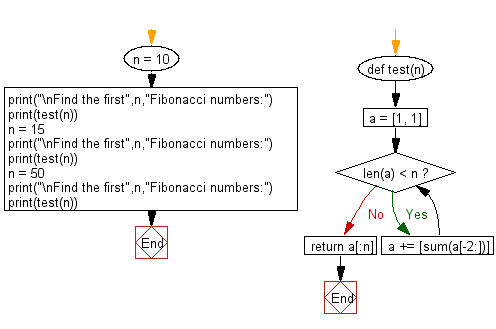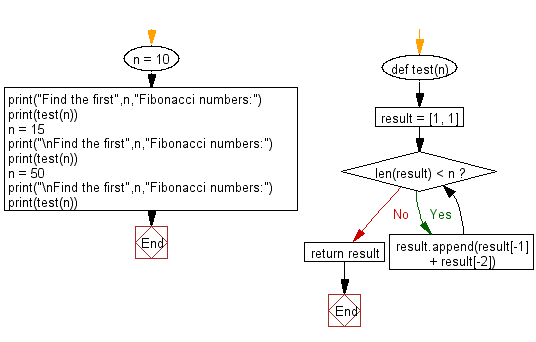Python: Find the first n Fibonacci numbers
Product of Units Digits
Write a Python program to find the product of the units digits in the numbers in a given list.
Input: 10 Output: [1, 1, 2, 3, 5, 8, 13, 21, 34, 55] Input: 15 Output: [1, 1, 2, 3, 5, 8, 13, 21, 34, 55, 89, 144, 233, 377, 610] Input: 50 Output: [1, 1, 2, 3, 5, 8, 13, 21, 34, 55, 89, 144, 233, 377, 610, 987, 1597, 2584, 4181, 6765, 10946, 17711, 28657, 46368, 75025, 121393, 196418, 317811, 514229, 832040, 1346269, 2178309, 3524578, 5702887, 9227465, 14930352, 24157817, 39088169, 63245986, 102334155, 165580141, 267914296, 433494437, 701408733, 1134903170, 1836311903, 2971215073, 4807526976, 7778742049, 12586269025]
Sample Solution-1:
Python Code:
# Define a function named 'test' that generates Fibonacci numbers
def test(n):
# Initialize a list 'a' with the first two Fibonacci numbers
a = [1, 1]
# Continue adding Fibonacci numbers to the list until it reaches the desired count 'n'
while len(a) < n:
# Append the sum of the last two numbers in the list to generate the next Fibonacci number
a += [sum(a[-2:])]
# Return the first 'n' Fibonacci numbers
return a[:n]
# Set the value of 'n' to 10
n = 10
# Print a message indicating the task and the value of 'n'
print("\nFind the first",n,"Fibonacci numbers:")
# Print the result of the test function applied to 'n'
print(test(n))
# Set the value of 'n' to 15
n = 15
# Print a message indicating the task and the value of 'n'
print("\nFind the first",n,"Fibonacci numbers:")
# Print the result of the test function applied to 'n'
print(test(n))
# Set the value of 'n' to 50
n = 50
# Print a message indicating the task and the value of 'n'
print("\nFind the first",n,"Fibonacci numbers:")
# Print the result of the test function applied to 'n'
print(test(n))
Sample Output:
Find the first 10 Fibonacci numbers: [1, 1, 2, 3, 5, 8, 13, 21, 34, 55] Find the first 15 Fibonacci numbers: [1, 1, 2, 3, 5, 8, 13, 21, 34, 55, 89, 144, 233, 377, 610] Find the first 50 Fibonacci numbers: [1, 1, 2, 3, 5, 8, 13, 21, 34, 55, 89, 144, 233, 377, 610, 987, 1597, 2584, 4181, 6765, 10946, 17711, 28657, 46368, 75025, 121393, 196418, 317811, 514229, 832040, 1346269, 2178309, 3524578, 5702887, 9227465, 14930352, 24157817, 39088169, 63245986, 102334155, 165580141, 267914296, 433494437, 701408733, 1134903170, 1836311903, 2971215073, 4807526976, 7778742049, 12586269025]
Flowchart:

Sample Solution-2:
Python Code:
# Define a function named 'test' that generates Fibonacci numbers
def test(n):
# Initialize a list 'result' with the first two Fibonacci numbers
result = [1, 1]
# Continue adding Fibonacci numbers to the list until it reaches the desired count 'n'
while len(result) < n:
# Append the sum of the last two numbers in the list to generate the next Fibonacci number
result.append(result[-1] + result[-2])
# Return the first 'n' Fibonacci numbers
return result
# Set the value of 'n' to 10
n = 10
# Print a message indicating the task and the value of 'n'
print("Find the first", n, "Fibonacci numbers:")
# Print the result of the test function applied to 'n'
print(test(n))
# Set the value of 'n' to 15
n = 15
# Print a message indicating the task and the value of 'n'
print("\nFind the first", n, "Fibonacci numbers:")
# Print the result of the test function applied to 'n'
print(test(n))
# Set the value of 'n' to 50
n = 50
# Print a message indicating the task and the value of 'n'
print("\nFind the first", n, "Fibonacci numbers:")
# Print the result of the test function applied to 'n'
print(test(n))
Sample Output:
Find the first 10 Fibonacci numbers: [1, 1, 2, 3, 5, 8, 13, 21, 34, 55] Find the first 15 Fibonacci numbers: [1, 1, 2, 3, 5, 8, 13, 21, 34, 55, 89, 144, 233, 377, 610] Find the first 50 Fibonacci numbers: [1, 1, 2, 3, 5, 8, 13, 21, 34, 55, 89, 144, 233, 377, 610, 987, 1597, 2584, 4181, 6765, 10946, 17711, 28657, 46368, 75025, 121393, 196418, 317811, 514229, 832040, 1346269, 2178309, 3524578, 5702887, 9227465, 14930352, 24157817, 39088169, 63245986, 102334155, 165580141, 267914296, 433494437, 701408733, 1134903170, 1836311903, 2971215073, 4807526976, 7778742049, 12586269025]
Flowchart:

For more Practice: Solve these Related Problems:
- Write a Python program to calculate the product of the last digit of each number in a list, ignoring any numbers ending in 0.
- Write a Python program to compute the product of the units digits of a sequence of numbers using recursion.
- Write a Python program to extract the units digit from each element in a list and multiply them together, returning the result modulo 100.
- Write a Python program to use reduce() to compute the product of the units digits in a list of integers.
Go to:
Previous: Find the even-length words and sort them by length.
Next: Reverse the case of all strings. For those strings, which contain no letters, reverse the strings.
Python Code Editor :
Have another way to solve this solution? Contribute your code (and comments) through Disqus.
What is the difficulty level of this exercise?
Test your Programming skills with w3resource's quiz.
